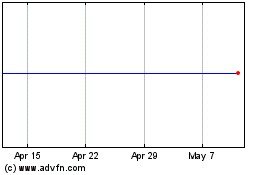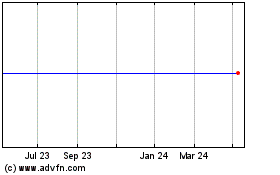Repo Rates Spike as Banks Hoard Cash But Markets Functioning -- Update
June 24 2016 - 3:07PM
Dow Jones News
By Katy Burne and Jenny Strasburg
Rates on overnight loans between banks spiked Friday, a sign
lenders were husbanding their cash as the U.K. vote to leave the EU
roiled markets.
Banks were paying an average of 0.8% around noon Friday to
borrow money from other lenders against high-quality government
bonds, according to broker ICAP PLC. That "repo" rate was up from
0.75% at the open of Friday's session and from 0.69% Thursday, as
votes on the U.K.'s continued membership in the EU trickled in. On
Wednesday, the rate was 0.57%, before the referendum began.
The moves were unusually large for a $3 trillion market in which
rates typically change by only one or two hundredths of a
percentage point a day.
"The volatility and flight to quality in the overall U.S.
Treasury market caused a panic this morning in the repo market,"
said Scott Skyrm, a repo and securities financing expert at Wedbush
Securities, who said he saw one borrower pay 1.15% for overnight
money.
Yields on benchmark 10-year Treasurys fell as low as 1.419%
early Friday amid heavy demand for the safe securities before
rebounding to 1.57%. Yields fall when prices rise.
Repos are crucial to the way financial firms fund their
portfolios of securities, and Federal Reserve officials were
keeping a close eye on the market. Staffers at the Federal Reserve
Bank of New York worked late into the night -- and some stayed
overnight -- just as many had during the financial crisis. They
then had briefings first thing in the morning about how markets
were responding to the surprise outcome in the U.K.
A spokeswoman for the bank, which uses the repo markets to help
implement the central bank's monetary policy moves, declined to
comment.
Markets were volatile Friday but appeared to be functioning
normally. Currency trading volumes surged overnight, as orders
flowed in from Asia when the U.K. voting results began to be
announced. Bank executives in the U.K. said they handled overall
volumes three to five times normal levels, and trading managers and
clients said that most systems largely held up.
Banks including Citigroup Inc. and UBS AG enacted backup plans
to handle more than the usual volume of foreign-exchange trades by
phone, rather than rely on electronic trading at the busiest times,
bank officials and traders said.
Many banks curtailed the size of electronic orders more than
usual to keep systems flowing, market participants said. Some said
the limits constrained or slowed down trading at times.
Bank officials said major lenders, including J.P. Morgan Chase
& Co., Deutsche Bank AG and Credit Suisse Group AG, repeatedly
stress-tested their systems for trading stocks, derivatives, debt
and other instruments ahead of the vote.
Trading desks at large banks in London reported a sharp slowdown
by midday Friday, with liquidity for trades decreasing as investors
clung to their cash amid uncertainty. Volatility halted trading at
some busy times, brokers said.
The market open in Europe was "outright chaotic," said Philip
Gough, chief executive of Convergex Ltd., the London-based
brokerage arm of Convergex Group. A lot of asset managers,
including hedge funds, stayed on the sidelines until later morning,
he said.
The International Swaps and Derivatives Association, a trade
group for users of hundreds of trillions of dollars in derivatives,
said the Brexit vote would have "significant implications" for
contracts and was working with member banks and others to ensure
the derivatives market is "able to continue functioning safely and
efficiently." It said it was preparing working groups for a series
of calls with industry groups.
The head of the U.S. Commodity Futures Trading Commission,
Timothy Massad, said the agency was closely monitoring the
derivatives markets and that they were functioning normally.
Bank executives in London said there was no pressure on
interbank funding, which is crucial to keep financial markets
functioning. The Bank of England and the European Central Bank have
made billions of euros and pounds available to prevent a 2008-style
credit crunch with the referendum vote.
In the U.S., the increasing cost of overnight loans spilled over
into the federal funds market, which sets the cost of related
overnight loans between banks and is used by the Fed to set its
benchmark interest rate. The daily effective fed-funds rate has
been rising in recent days. ICAP quoted the intraday fed-funds rate
at 0.40% early Friday, up from 0.39% on Thursday and 0.37% last
week.
The Fed said Friday it is prepared to supply dollars to central
banks overseas as needed to ease pressure on the markets around the
globe where banks raise needed funds.
"Banks want to lock up cash over the weekend to make sure they
are on steady footing amid the uncertainty," said Michael Watt,
senior managing director of sales in INTL FCStone Financial's
interest rates group in Jersey City, N.J.
--Giovanni Legorano and Serena Ng contributed to this
article.
Write to Katy Burne at katy.burne@wsj.com and Jenny Strasburg at
jenny.strasburg@wsj.com
(END) Dow Jones Newswires
June 24, 2016 14:52 ET (18:52 GMT)
Copyright (c) 2016 Dow Jones & Company, Inc.
ICAP (LSE:IAP)
Historical Stock Chart
From Mar 2024 to Apr 2024

ICAP (LSE:IAP)
Historical Stock Chart
From Apr 2023 to Apr 2024
